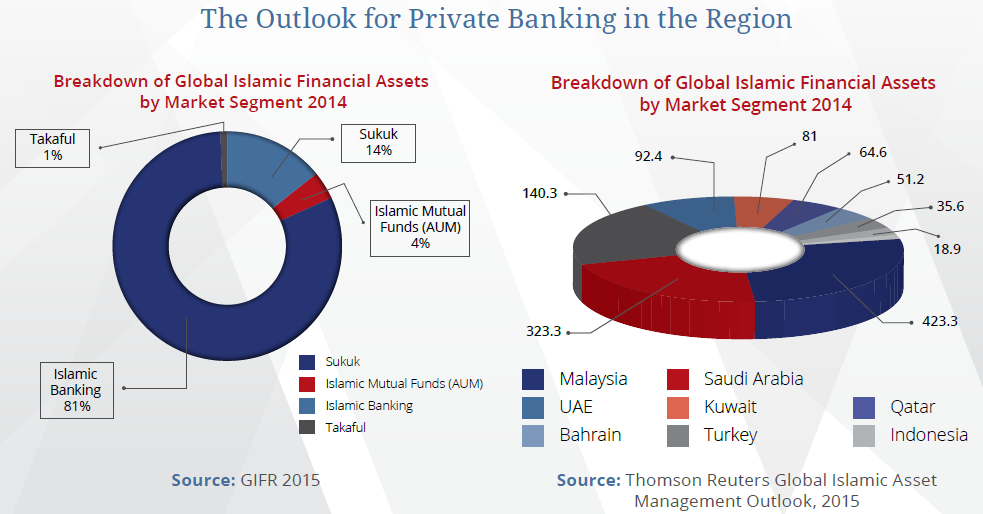Dr Hatim El Tahir, Director Islamic Finance Group and Leader of Deloitte ME Islamic Finance Knowledge Centre shares his insight into the prospects of Islamic private banking in the Middle East, especially the GCC.
Private banking in the Middle East-Asia has developed into a mature market with well-established private banking hubs and high growth potentials. This is particularly true in the Arab Gulf region. Since the 1960s, Lebanon developed a well-advanced private banking services sector and was referred to as Switzerland of the Middle East. In the 1980s, Bahrain emerged as an offshore banking center, and more recently Dubai is contemplated as an Islamic investment and wholesale banking hub. In the Far East, Labuan has emerged as an international financial centre, challenging its more developed neighbor Singapore, and has started attracting significant volume of business falling in the realm of Islamic wealth management. A number of institutions from the Middle East have also started showing interest in establishing business in Malaysia in general and in Labuan in particular.
In this context, the Islamic wealth landscape continues to change at a rapid pace. Organizations that grew out of the family business are evolving into sophisticated wealth and investment managers. Family offices
in the Gulf region and elsewhere in the Middle East are now adopting more formal governance structures, realigning their organizational structures, implementing risk management strategies, embedding more rigorous internal controls, and introducing up-to-date technology solutions.
In the Far East, Labuan has emerged as an international financial centre, challenging its more developed neighbor Singapore, and has started attracting significant volume of business falling in the realm of Islamic wealth management.
The HNWIs and UHNWIs in the gulf region are set to grow in number and wealth holdings in the coming years and remain the most attractive segments in the long run. Globally, the number of millionaire households, i.e., HNWI population in the Middle East grew by 16% between 2012-20131.
However, in order to rapidly gain market shares and capture additional margins, Islamic wealth managers in the region can also consider targeting the mass affluent client segment by proposing a diversified
Sharia’-compliant service offering.
Nevertheless, Saudi Arabia, United Arab Emirates, Kuwait and Bahrain, are well-established centres for fund distribution and wealth management. Bahrain has a thriving funds’ industry established since the 1980s, with the first Bahraini-domiciled fund being launched in the Kingdom in 1984. Bahrain is, in fact, home to the region’s largest range of funds – 2,827 registered funds at April 2014. Of these, 92 are Bahraini-domiciled schemes and 41 are Islamic funds2.
Unlike other oil-rich neighbours, Bahrain’s limited natural resources have encouraged policy-makers to look elsewhere for growth, especially in the financial sector. The financial sector is the largest single employer in Bahrain, with Bahrainis representing over 66% of the workforce. Overall, the sector contributes 17% of Bahrain’s gross domestic product (GDP), making it one of the key drivers of growth in the country.
Favourable Regulatory Environment
Historically, the Central Bank of Bahrain had constantly strategized the country’s position as a regional Islamic financial centre. Its Collective Investment Undertakings (CIUs) rulebook is one of the best in the region
and matches with international best practices. The financial regulator adopted good governance and code of ethics standards. Other regulatory environment also features:
- Low and competitive tax regime (both on personal and corporate level);
- Absence of exchange controls or restrictions on capital flows;
- Friendly business and developed financial environment; and
- Proximity to various Gulf private banking markets,
- e. g., the largest economy of Saudi Arabia.
Bahrain as a Competitive Marketplace
Bahrain is a Gulf cross-border hub for Islamic wealth management. The status of Bahrain as a Middle East cross-border hub is one of its major advantages and a key location factor in the global Islamic wealth management landscape. Bahrain continues to position itself as a global specialist in the Islamic financial industry and the Central Bank of Bahrain continued to enhance regulatory and business environments in the country.
- Long-term presence: the major international private banks have for years been active in the Gulf.
- The Arab Gulf is relatively less affected by the global financial crisis, hence the on-going creation of wealth, despite the recent oil price drop and geopolitical risks.
More generally, and in order to rapidly grow this niche market in the region, Islamic wealth managers can also consider targeting the mass affluent client segment by proposing diversified Sharia-complaint service offerings. This strategic choice can help grow the Islamic assets under management (AUM). On the other hand, focusing on the UHNW and HNW segments represents a long-term choice for private banking players who will need to adapt their services to satisfy their clients.

In many ways, traditional players have been established for years now in key markets. New market players are joining and are set to introduce innovative Sharia-compliant wealth management solutions.
In this context, global tier-one private banks, Swiss Boutique and other European private banking institutions are setting foot-print and expanding their service offering to cater for Islamic wealth management.
A number of factors will strengthen the shaping of this niche industry in the region:
- Addressing regulatory compliance requirements in an efficient manner
- Improving financial infrastructure and operating models
- Product development and marketing strategies to attract migration of assets invested in Europe and the USA
- Growth strategies to operational efficiencies
- Defining a target-appropriate geographical footprint (geographical footprint optimization)
- Defining proper product and service range and coverage
- Defining appropriate and best communication channels
- Defining new pricing models
- Upgrading staff skills sets
Conclusion
Bahrain in the GCC and Labuan in the Far East are two important centres of Islamic wealth management, and there is a definite need to create institutional links between the two to offer a geographically diversified choice to the Islamic HNWIs and UHNWIs for high-quality Islamic wealth management solutions.



